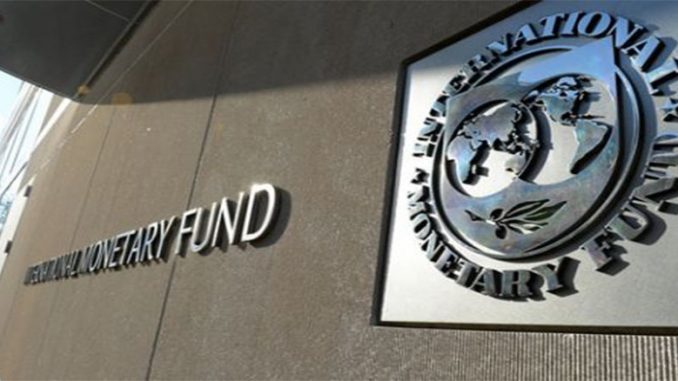
A team from the International Monetary Fund (IMF) is conducting a mission to Tunisia from Wednesday July 26 to August 3, 2017 to assess the economic progress and discuss with the Tunisian authorities the progress of reforms undertaken to boost the Tunisian economy, according to Tunisia News Agency.
The IMF, one of Tunisia’s main donors, suggested, in its latest Country Staff Report on Tunisia published on July 10, 2017 that the economy is not keeping pace with the ongoing democratic transition in this country, perceived as the sole survivor of an Arab spring in agony.
The Fund therefore recommends measures to improve budgetary outcomes, including tax administration development, voluntary reduction of the public service, comprehensive pension reform to limit transfers to social security at 0.5% of GDP in 2018, a strengthening of the performance of public enterprises and a reform of subsidies.
In the medium term, the Tunisian authorities have agreed with the (IMF) mission to improve monetary policy operations to ensure a better transmission of monetary policy to the real economy.
According to the IMF report, Tunisia’s political transition has advanced, but social discontent remains elevated and the economy remains fragile in a complex socio-political environment.
Structural deficiencies, an overvalued real exchange rate and weak confidence after the 2015 attacks continue to weigh on investment, the report notes, pointing out that exogenous shocks and policy slippages contributed to widen the current account deficit by more than 10 percent of GDP in the first quarter of 2017.
The authorities and IMF staff, therefore, agreed that Tunisia’s economic transition requires a shift from the public sector towards a competitive private sector as the main engine of growth and job creation.
At the same time, the country faces high and rising twin deficits and debt levels, as well as inflationary pressures, which all disproportionally affect the most vulnerable.
Greater exchange rate flexibility and monetary policy tightening would improve the external current account deficit, mitigate inflationary pressures, and increase international reserve cover.
The IMF also advocates measures to strengthen the financial health of the social security funds and build better targeted social safety nets will help to maintain adequate social protection and accelerated progress with comprehensive structural reforms in order to support higher and more inclusive growth.
A stronger adjustment effort and more financing will be required, according to the IMF. Given lower growth and higher deficits, the adjustment effort through 2020 will have to be more ambitious to maintain macroeconomic stability.
Budget outturns through March signal that the targets remain realistic. Moreover, the authorities have identified contingency measures, including a 0.4 percent of GDP spending cut, in case larger-than-expected transfers to the pension funds are needed.
It is necessary to start sustainable deficit reduction in 2018, according to the IMF. “A strong package of measures would reduce the overall deficit to 5.4 percent of GDP from 5.9 percent in 2017, and the underlying structural deficit to 4.3 percent of GDP from 6.1 percent in 2017.”
The package also improves fairness by widening the tax base, increasing VAT rates on services of liberal professions, and raising excises on goods and services prevalently consumed by higher-earning households.
The IMF Staff emphasized the need to target financial profits, rather than transactions, to avoid a negative impact from the financial activities taxes on financial development.
Delayed economic transition
The IMF report said Tunisia’s democracy weathered many challenges, but economic transition is delayed.
Sustainable increases in employment and standards of living for Tunisia’s young population will only be possible by transforming the country’s economic model, which relies on unsustainable levels of public consumption—including for wages and subsidies—as well as on inefficient legal and regulatory frameworks that limit competition and discourage formal private sector activity.
The objectives set for Tunisia, including ensuring pension sustainability and better protecting the vulnerable, while accelerating reforms to improve governance and foster private sector-led, job-creating growth would be feasible only with effective legal and regulatory systems that do not limit competition and do not discourage formal private sector activity, according to the IMF.
According to the report, the authorities have already acted to contain, albeit at a high level, the fiscal deficit in 2016 and stop its further growth in 2017.
“Monetary tightening is now necessary even in the presence of weak growth, as structural deficiencies, exchange rate depreciation, and higher administered prices and taxes increase inflation risks.”
To gradually achieve debt reduction and create more fiscal space for investment and social policies, it is important to hold the course on structural reforms in critical areas such as civil service, pensions, and public enterprises, the IMF recommends.
The success of the next phase of public bank restructuring will depend on more determined measures to help banks reduce their sizeable NPL portfolios.
Governance and business environment reforms will be crucial for private sector development and jobs growth.
Fiscal consolidation can proceed in a growth-friendly and socially-conscious way.
Staff supports the authorities’ policies for 2017-18 and beyond that are ambitious but also strike a reasonable balance between the feasible and the desirable in a difficult socio-political environment, the IMF pointed out.
The IMF also recommends other steps to reinforce revenue administration for more effective collection of sizeable tax and customs arrears (totaling 6 percent of GDP).
The IMF Staff also supports more exchange rate flexibility and a tightening of monetary policy and is for maintaining the exchange rate in line with evolving fundamentals is crucial to restore competitiveness and increase reserves.
Deep reform of the civil service highly recommended
Deep reform of the civil service will improve service quality and create fiscal space, the IMF said in its report.
It especially welcomes the authorities’ efforts to reduce the public wage bill, which is among the highest in the world. The reduction hinges on avoiding further new wage increases through 2020; and on successful voluntary departure programmes for the public workforce in combination with strict and continued controls over future recruitments.
Social protection has to be adequate and targeted
Efforts to maintain adequate social protection are critical for a successful transition, according to the IMF that welcomed the recent steps taken to ensure adequate financing for social security in the short term and urges the authorities and social partners to proceed quickly with equitable and sustainable pension reforms.
The Fund also recommends finalizing the database of vulnerable households to respond to the needs of the poor and the vulnerable in a cost-effective way.
It reviewed in its report the improved management of contingent risks from public enterprises, noting that performance contracts for SOEs will require strong ownership from the side of the authorities to be effective. Improving financial information and upgrading the capacity of the Ministry of Finance to monitor performance and apply sanctions are also important.
The IMF estimates, however, that the programme (EFF) risks remain elevated. “Recent experience has demonstrated the difficulties of keeping the macroeconomic program and the structural reform agenda on track in the presence of weak growth and large exogenous shocks,” notes the report.
On June 12, 2017, the Executive Board of the International Monetary Fund (IMF) completed the first review of Tunisia’s economic program supported by an arrangement under the Extended Fund Facility (EFF).
The completion of the review allows the authorities to draw the equivalent of SDR 227.2917 million (about US$314.4 million), bringing total disbursements under the arrangement to the equivalent of SDR 454.5837 million (about US$628.8 million).
The four-year EFF arrangement in the amount of SDR 2.045625 billion (about US2.83 billion, 375 percent of Tunisia’s quota) was approved by the Executive Board on May 20, 2016.
The government’s reform programme supported by the EFF aims at reducing the fiscal deficit to stabilize public debt below 70 percent of GDP by 2020 while raising investment and social spending, and more exchange rate flexibility combined with maintaining inflation below 4 percent.
The Tunisian authorities aim to improve the overall budget deficit by 3 per cent of GDP compared to 2017-2020 (about 0.5 per cent of GDP compared with the initial programme). Although the public debt-to-GDP ratio will remain significantly higher than projected at the start of the Extended Fund Facility by 2020 and after peaking at 72% in 2018, it is expected to be 70 %.



